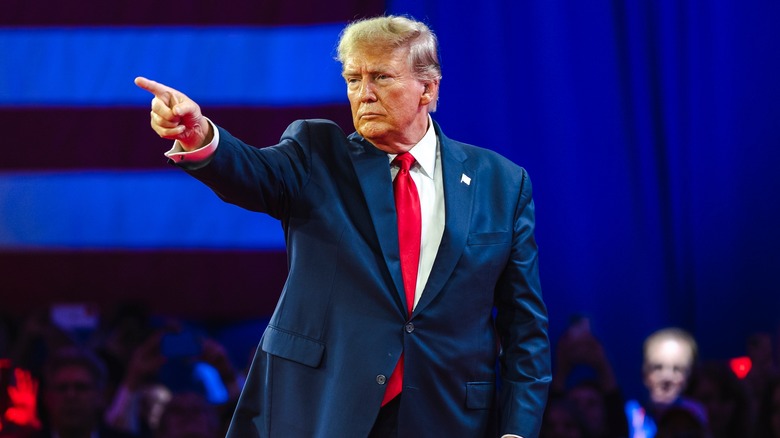Rights Donald Trump Could Lose As A Convicted Felon
On May 30, 2024, a jury of 12 of Donald Trump's New Yorker peers delivered a verdict of guilty on all 34 counts of falsifying business records related to hush money paid out to adult film actress Stormy Daniels. As the story goes, Daniels and Trump had sex back in 2006, and come Trump's 2016 vie for presidency his lawyer and "fixer" Michael Cohen paid her $130,000 to keep quiet about it. In and of itself this isn't actually a crime. But, the former president fiddled with financial records when he reimbursed Cohen, which is a low-ranking "Class E" felony in New York. We previously explained the charges against Trump, which some legal experts thought would be difficult to prove.
Now that Trump has been convicted, many folks are wondering what's going to happen to him and his impending nomination for Republican presidential candidate. In general, the 77-year-old Trump could face from 16 months to four years in prison per felony charge, but this seems unlikely because he's never been convicted of a crime before. Rather, Trump is likely looking at fees plus negotiations with a probation officer to do some basic things that he'd have to do when running for president, like traveling out of New York State.
As for what rights Trump loses as a convicted felon, the truth is: Not many. He won't be able to carry a firearm or sit on a jury in Florida, for instance. He will, however, still be able to run for president.
Trump can run for president but can't vote behind bars
Just to get the big question out of the way: Yes, Donald Trump can still be president of the United States despite being a convicted felon. The requirements for presidency are shockingly thin. Candidates only have to meet three criteria: be over 35 years old, be a natural-born citizen, and have lived in the country for at least 14 years. Ridiculous as it sounds, Trump could even run for president from prison if he does wind up behind bars in addition to paying fees as punishment. Those fees amount to up to $5,000 per charge, or $170,000 — $40,000 more than the hush money he paid to Daniels.
If Trump goes to prison, though, he won't be able to vote for himself. Because he was tried and convicted in New York he has to abide by New York laws regarding felonies and the rights of felons, which deny felonious prisoners the right to vote. But if the judge in question decides to send Trump to prison, the politician could still get out of it in the short-term by appealing the conviction. In this case he could not only run for president, but even give himself a vote on Election Day.
Aside from these restrictions, the Bureau of Alcohol, Tobacco, Firearms, and Explosives says that anyone "convicted in any court of a crime punishable by imprisonment for a term exceeding one year" can't "ship, transport, receive, or possess firearms or ammunition." That includes Trump.
Florida residential complications and presidential pardons
All of Donald Trump's other restrictions and losses of rights relate to him being a resident of Florida. As a convicted felon, he will lose the right to serve on a Florida jury until he's paid his fees and completed his sentence, including any prison time, per the Florida Division of Elections. At that point, the Florida State Clemency Board has to actively decide to restore Trump's right to vote. Florida law also prohibits felons from voting in the state if a felony conviction would prevent a person from voting in the state where he or she was convicted. As we mentioned, Trump's clear to vote in New York provided he's not in prison, so this particular proviso doesn't apply to him.
And finally, we'd be remiss to not mention a potential presidential hack that some folks might have thought of: pardons. Can Trump absolve himself if he becomes president again? Bizarrely enough, he could — if he was convicted of a federal criminal charge, that is. As the Constitution Annotated explains, presidential pardoning power has limits and doesn't extend to state-level crimes or federal civil charges. Analysis of the U.S. Constitution can get complicated, but this part at least seems airtight.
As for Trump's punishment, we'll have to wait till July 11 to see how it plays out. July 11, it should be noted, is a mere four days before the GOP will likely nominate Trump for presidency at the Republic National Convention.


